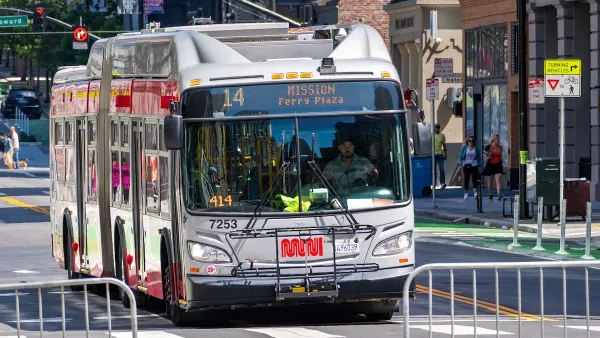Nathan Heller illuminates how the tech industry has rendered San Francisco the new "power city" for U.S. economic growth and culture.
Previously, San Francisco was never an "industry town" to the same extent as other major U.S. cities like New York (media and finance) or Los Angeles (entertainment). However, Heller asserts, the ever-expanding role of "tech" in the modern world is changing that:
San Francisco is an industry town. This industry is usually called 'tech,' but the term no longer signifies what it used to. Tech today means anything about computers, the Internet, digital media, social media, smartphones, electronic data, crowd-funding, or new business design.
Heller argues that tech is not just the dominate industry of the San Francisco area, but of the entire country if not the world, and a confluence of entrepreneurs and the venture capitalists who fund them makes the city ground zero for the modern economy and prevailing culture. San Francisco is the new go-to destination for ambitious, creative people, giving rise to ad hoc interdisciplinary incubator spaces and career paths that transcend labels. These places and people are redefining the metropolis, which is no longer "a Dungeness crab of a city, shedding its carapace from time to time and burrowing down until a new shell sets."
FULL STORY: Bay Watched

Planetizen Federal Action Tracker
A weekly monitor of how Trump’s orders and actions are impacting planners and planning in America.

Map: Where Senate Republicans Want to Sell Your Public Lands
For public land advocates, the Senate Republicans’ proposal to sell millions of acres of public land in the West is “the biggest fight of their careers.”

Restaurant Patios Were a Pandemic Win — Why Were They so Hard to Keep?
Social distancing requirements and changes in travel patterns prompted cities to pilot new uses for street and sidewalk space. Then it got complicated.

Platform Pilsner: Vancouver Transit Agency Releases... a Beer?
TransLink will receive a portion of every sale of the four-pack.

Toronto Weighs Cheaper Transit, Parking Hikes for Major Events
Special event rates would take effect during large festivals, sports games and concerts to ‘discourage driving, manage congestion and free up space for transit.”

Berlin to Consider Car-Free Zone Larger Than Manhattan
The area bound by the 22-mile Ringbahn would still allow 12 uses of a private automobile per year per person, and several other exemptions.
Urban Design for Planners 1: Software Tools
This six-course series explores essential urban design concepts using open source software and equips planners with the tools they need to participate fully in the urban design process.
Planning for Universal Design
Learn the tools for implementing Universal Design in planning regulations.
Heyer Gruel & Associates PA
JM Goldson LLC
Custer County Colorado
City of Camden Redevelopment Agency
City of Astoria
Transportation Research & Education Center (TREC) at Portland State University
Camden Redevelopment Agency
City of Claremont
Municipality of Princeton (NJ)




























